商务英语阅读(第二版) 王关富 Unit 6 Goodbye, Free Trade 课后答案
- 格式:doc
- 大小:80.50 KB
- 文档页数:6
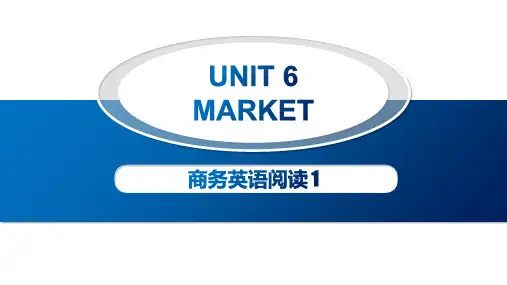
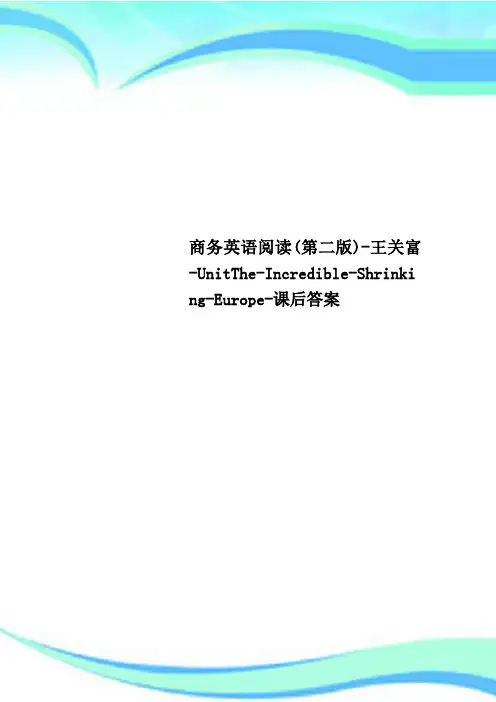
商务英语阅读(第二版)-王关富-UnitThe-Incredible-Shrinki ng-Europe-课后答案————————————————————————————————作者:————————————————————————————————日期:Unit 4The Incredible Shrinking EuropeExercises1. Answers to the questions on the text:1) What was the dream that the Europhiles were familiar with?Their dream was to make E.U. a newly emboldened world power stepping up to calm trouble spots, using aid and persuasion where it could, but prepared to send in troops when it had to.2) Why does the passage say that Europe is a remarkably good place to live?Because Europe is more stable, safe, green and culturally diverse than most parts of the world and a quality life can be guaranteed in E.U. states.3) Does the good life at home make Europe strong abroad ? Why?No, a good life at home doesn’t mean a strong Europe abroad. Because the E.U.may have all the soft-power credentials in the world, but on the grand stage it has lacked the weight and influence of others on some big issues.4) What do Critics think of the selection of Herman Van Rompuy and Catherine Ashton as Europe's President and Foreign Minister?They consider the selection as symbolic of a lack of vision and it means the grouping will have to reconcile itself to five years of underperformance.5) What can be listed as E.U.’s achievements in the years around 1980s according to the passage?By extending an area of peace and liberal government to the east, the E.U. has done much to calm a part of the world that not long ago was the cockpit for murderous rivalries.6) In what way can Europe realize its own dreams and those of others according to the passage?It has to act as a true single bloc and win others to its side.7) Why does the German government face enormous domestic challenges in admitting its forces in Afghanistan are there to fight, not to be humanitarian workers in uniform ?Because one of modern Europe's most cherished convictions is that the force of arms rarely settles political disputes for long and European public opinion in the 20th century seems unwilling to commit to the war in Afghanistan for the long haul.8) What roles did Germany play in Europe in the 20th century?For the last half of the 20th century, Germany was at the heart of the European experiment. But since the end of the Cold War, it has stepped back from the E.U.and begun strengthening ties with Russia.9 What are the advantages for E.U. to be chosen as the White House’s partner?The advantages are that Europe is rich and democratic, and its values arecloser to those of the U.S. than those of anywhere else.2. Fill in each blank of the following sentences with one of the phrases in the listgiven below. Make changes when necessary.1) China will adhere to the principle of developing high technology and realizingindustrialization to step up the commercialization, industrialization and internationalization of scientific and technological achievements.2) In the recent crisis no banks could manage to bail out the companies in financialpressure.3) In terms of the information from the Universe he is apathetic and sometimesirritable, he is like an ostrich sticking his head in sand.4) It will be up to the board to decide if the CEO should be removed.5) All our hopes rest upon the arrival of the shipment.6) The plan has already been worked out, and could be put into operation at amoment's notice.7) The whole machinery of civilization will break down if this doctrine wins in thewar.8) His remarks hit home when he said that we did not work enough.9) Some analysts suspected that Toyota had pulled strings to stifle probes into itsauto quality problems.10) Mercy is reaching out to those who have nothing to give back to you.3. Match the terms in column A with the explanations in column B:A ____________________ B_____________________________________1)free market A) Effects on the behavior of individuals causedby observation of the actions of others and theirconsequences. 32) coalition government B) An economic turmoil where companies gobankrupt, people are laid off, and markets aresluggish. There is a lot of panic in bothbusiness and daily lives.93) demonstration effects C) A market in which there is no economicinterventionby the state, except to enforceprivate contracts and the ownership of property.14) health insurance D) A qualified retirement plan set up by acorporation, laborunion, government, orotherorganization for itsemployees. 6E) A form of collectivism by means of whichpeople collectivelypool their risk, in this casethe risk of incurringmedical expenses. 45) national interest F) The ability to obtain what one wants througheconomic or cultural means. It allows nations toexert their influence without using militarymeans or coercion. 86) pension scheme G) A fight or contention for territory, power,control, or resources between tow more partiesin a place or area.. 77) turf war H) Things of great importance to a nation,including itsgoals, visionsand ambitions inpolitical,economic,cultural fields,etc. and actions,circumstances,and decisions toachieve them. 5 8) soft power I) A cabinet of a parliamentary government inwhich severalparties cooperate. 29) economic crunch4. Translate the following into Chinese.有什么能让欧洲振奋起来吗?当然:如果欧洲领导人能像20年前那样抓住时机,欧盟就将繁荣昌盛。
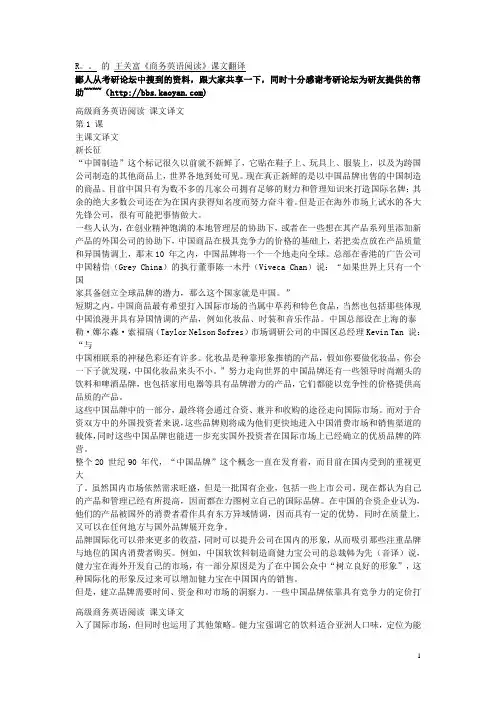
R。
的王关富《商务英语阅读》课文翻译鄙人从考研论坛中搜到的资料,跟大家共享一下,同时十分感谢考研论坛为研友提供的帮助~~~~()高级商务英语阅读课文译文第1 课主课文译文新长征“中国制造”这个标记很久以前就不新鲜了,它贴在鞋子上、玩具上、服装上,以及为跨国公司制造的其他商品上,世界各地到处可见。
现在真正新鲜的是以中国品牌出售的中国制造的商品。
目前中国只有为数不多的几家公司拥有足够的财力和管理知识来打造国际名牌;其余的绝大多数公司还在为在国内获得知名度而努力奋斗着。
但是正在海外市场上试水的各大先锋公司,很有可能把事情做大。
一些人认为,在创业精神饱满的本地管理层的协助下,或者在一些想在其产品系列里添加新产品的外国公司的协助下,中国商品在极具竞争力的价格的基础上,若把卖点放在产品质量和异国情调上,那末10 年之内,中国品牌将一个一个地走向全球。
总部在香港的广告公司中国精信(Grey China)的执行董事陈一木丹(Viveca Chan)说:“如果世界上只有一个国家具备创立全球品牌的潜力,那么这个国家就是中国。
”短期之内,中国商品最有希望打入国际市场的当属中草药和特色食品,当然也包括那些体现中国浪漫并具有异国情调的产品,例如化妆品、时装和音乐作品。
中国总部设在上海的泰勒·娜尔森·索福瑞(Taylor Nelson Sofres)市场调研公司的中国区总经理Kevin Tan 说:“与中国相联系的神秘色彩还有许多。
化妆品是种靠形象推销的产品,假如你要做化妆品,你会一下子就发现,中国化妆品来头不小。
”努力走向世界的中国品牌还有一些领导时尚潮头的饮料和啤酒品牌,也包括家用电器等具有品牌潜力的产品,它们都能以竞争性的价格提供高品质的产品。
这些中国品牌中的一部分,最终将会通过合资、兼并和收购的途径走向国际市场。
而对于合资双方中的外国投资者来说,这些品牌则将成为他们更快地进入中国消费市场和销售渠道的载体,同时这些中国品牌也能进一步充实国外投资者在国际市场上已经确立的优质品牌的阵营。
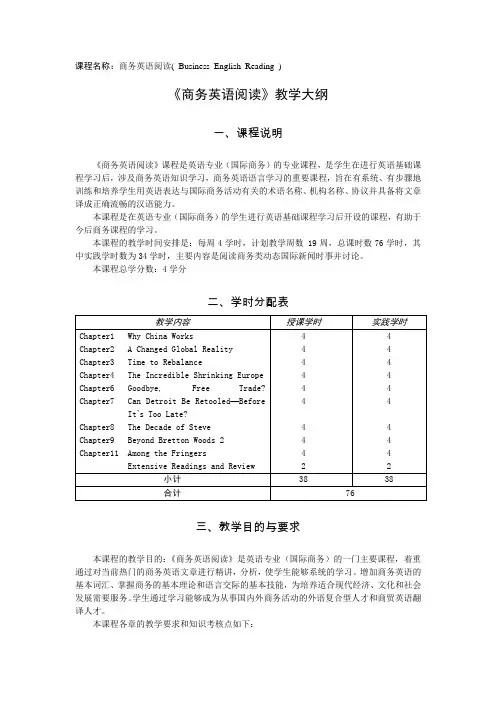
课程名称:商务英语阅读( Business English Reading )《商务英语阅读》教学大纲一、课程说明《商务英语阅读》课程是英语专业(国际商务)的专业课程,是学生在进行英语基础课程学习后,涉及商务英语知识学习,商务英语语言学习的重要课程,旨在有系统、有步骤地训练和培养学生用英语表达与国际商务活动有关的术语名称、机构名称、协议并具备将文章译成正确流畅的汉语能力。
本课程是在英语专业(国际商务)的学生进行英语基础课程学习后开设的课程,有助于今后商务课程的学习。
本课程的教学时间安排是:每周4学时,计划教学周数 19周,总课时数76学时,其中实践学时数为34学时,主要内容是阅读商务类动态国际新闻时事并讨论。
本课程总学分数:4学分二、学时分配表三、教学目的与要求本课程的教学目的:《商务英语阅读》是英语专业(国际商务)的一门主要课程,着重通过对当前热门的商务英语文章进行精讲,分析,使学生能够系统的学习。
增加商务英语的基本词汇、掌握商务的基本理论和语言交际的基本技能,为培养适合现代经济、文化和社会发展需要服务。
学生通过学习能够成为从事国内外商务活动的外语复合型人才和商贸英语翻译人才。
本课程各章的教学要求和知识考核点如下:第一章中国模式为何奏效通过本课程的学习使学生了解中国与欧美国家自由市场经济不同的经济模式—计划经济与市场经济并存所取得的成效,了解中国领导人进行市场改革开放以来的作为与成就,成功的因素,以及与西方经济模式对比之下的不同之处。
本章的主要知识点是:计划市场经济、自由市场经济及中国改革开放。
难点是:课文生词应用,white goods白色家电,如冰箱,洗衣机,微波炉,消毒碗柜等,premium brands高档品牌的商品。
第二章全球现状新解本章通过了解第三世界国家新兴市场的观点和论说,并从历史的角度帮助学生体会对经济规模和管理的发展趋势。
本章的主要知识点是:供应链、库存周转率、规模经济、产业调整等。
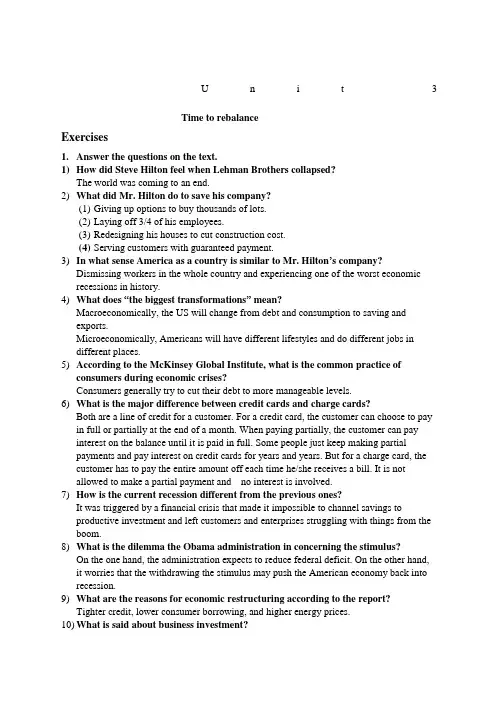
U n i t 3Time to rebalanceExercises1.Answer the questions on the text.1)How did Steve Hilton feel when Lehman Brothers collapsed?The world was coming to an end.2)What did Mr. Hilton do to save his company?(1)Giving up options to buy thousands of lots.(2)Laying off 3/4 of his employees.(3)Redesigning his houses to cut construction cost.(4)Serving customers with guaranteed payment.3)In what sense America as a country is similar to Mr. Hilton’s company?Dismissing workers in the whole country and experiencing one of the worst economic recessions in history.4)What does “the biggest transformations” mean?Macroeconomically, the US will change from debt and consumption to saving andexports.Microeconomically, Americans will have different lifestyles and do different jobs indifferent places.5)According to the McKinsey Global Institute, what is the common practice ofconsumers during economic crises?Consumers generally try to cut their debt to more manageable levels.6)What is the major difference between credit cards and charge cards?Both are a line of credit for a customer. For a credit card, the customer can choose to pay in full or partially at the end of a month. When paying partially, the customer can pay interest on the balance until it is paid in full. Some people just keep making partialpayments and pay interest on credit cards for years and years. But for a charge card, the customer has to pay the entire amount off each time he/she receives a bill. It is notallowed to make a partial payment and no interest is involved.7)How is the current recession different from the previous ones?It was triggered by a financial crisis that made it impossible to channel savings toproductive investment and left customers and enterprises struggling with things from the boom.8)What is the dilemma the Obama administration in concerning the stimulus?On the one hand, the administration expects to reduce federal deficit. On the other hand, it worries that the withdrawing the stimulus may push the American economy back into recession.9)What are the reasons for economic restructuring according to the report?Tighter credit, lower consumer borrowing, and higher energy prices.10)What is said about business investment?It is expected to be robust, especially for equipment. But it can never substitute consumer spending.11)What changes have occurred in the United States in terms of consumption?(1)American consumers spend less but save more.(2)American companies thus look to an export boom abroad.(3)The US has changed from a consuming nation to an exporting economy, accountingfor only 27% of global consumption this year, much less than that of emergingmarkets.12)What makes the report optimistic about the American economy?(1)The US has been increasing exports abroad, particularly emerging markets.(2)America’s current-account deficit dropped from 6% to 3%.(3)American firms are busy preparing for their investment.2.Fill in each blank of the following sentences with one of the phrases in the list givenbelow. Make changes when necessary.1)Investors from big cities are quick to snap up real estates in this booming town for theirrising future values.2)There are already clear signals that the investors will shift away from the financial firmin legal trouble.3)High input are likely to put pressure on steel prices in the domestic market even ifdemand still remains high.4)The prime minister said Thursday that a new international airport will be built in thesouthern city to cater to the rising number of passengers and air cargoes there.5)Many economists fear that the contraction of money supply may dry up financing neededfor various economic activities.6)Professor Nil was, however, quick to warn the public to be on their guard against thosecounterfeits already in circulation.7)Academy Awards, Emmy Awards and dozens of prestigious awards from prominent filmfestivals around the world attest to the stellar quality of the films being featured at the annual World Community Film Festival.8) A neighborhood group in the district plans to hold a fundraiser to help children pay offoverdue book fines so that they can resume using their library.9)The writer’s fame shrank last year because the public thought he was knocking out somany things.10)Business leaders have urged the government to snap up farmland overseas to growbasic staples as a buffer against soaring food prices.11)The Vancouver team vowed to get back to doing the little things right and knew it wouldadd up to big things.12)What has happened over the past few years indicates that great political, social andeconomic transformations are in the making.3.Match the terms in column A with the definitions in column B.A_______________________ B________________________________________1)emerging market A) A contract that permits the owner, depending onthe type of option held, to purchase or sell anasset at a fixed price until a specific2)profit margin B) A construct that represents economicby a set of and a set ofand quantitative relationships between3)consumer spending C) An economy, with fast growth rate but low tomiddle per capita income, has opened up itsmarket and integrated itself into the global4)consumerism D) The process of moving from a period of lossesor low profitability into a more profitable stagefor a firm, industry or5)disposable income E) of after to cost-of-sales, oftenexpressed a , ing theof a and indicating its6)option F) Portion of the consistingof exports and imports of goods and services, aswell as transfer payments such as foreign aidgrants. 97)economic restructuring G) The amount of money spent by households,measured monthly, making up an important partof an8)turnaround H) The phenomenon of an economy shifting froma to a economicbase. 79)current account I) A movement equating personal happiness withpurchasing material possessions and. 410)economic model J) The of to anhave been , forspending and . 54.Translate the following passage into Chinese:目前石油价格飞涨,接近110美元一桶,食品和其他货物的成本也随之上涨。
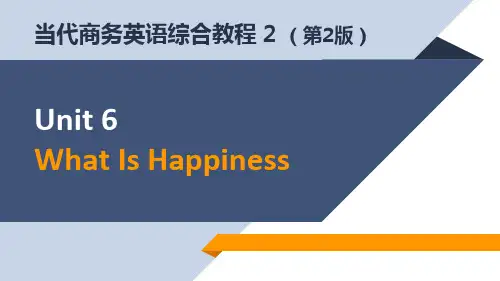
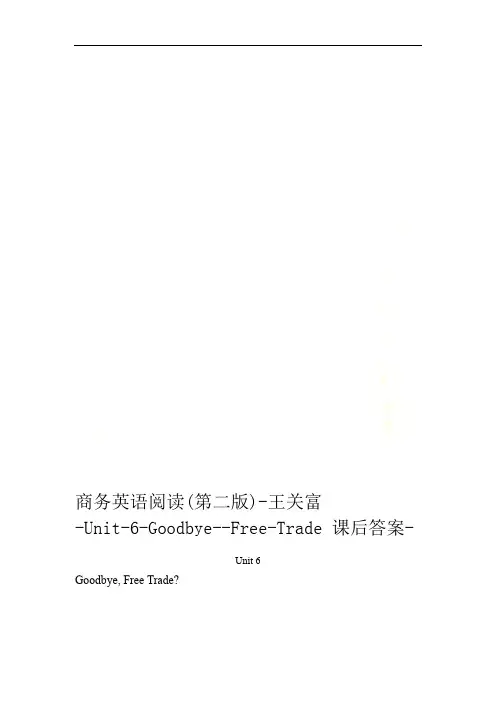
商务英语阅读(第二版)-王关富-Unit-6-Goodbye--Free-Trade 课后答案-Unit 6Goodbye, Free Trade?Exercises1.Answer the questions on the text.1) What was the result when the House of Representatives passed the Hawley-Smoot Tariff Act in 1930?The economic recession in the United States became even worse.2) According to the author, what happens when a currency appreciates? It diminishes the export advantage of the country and makes it difficult to increase exports or even maintain the status quo.3) How did American politicians take advantage of the public's stronganti-free-trade sentiment in the United States?They created a talking point in charges of unfair trade so that they thoughtthey could benefit in the mid-term elections.4) What did American politicians and economists agree and disagree over the Hawley-Smoot Tariff Act?Almost all of them agreed that it was a bad law, but they disagreed whether it triggered the Great Depression in the 1930s.5) What did Milton Friedman think were the more important reasons for the Great Depression?The malfunctioning gold standard system and inept monetary policy of the Federal Reserve.6) What was the foreign reaction unexpected by the American lawmakers after the Hawley-Smoot Tariff Act was enacted?The trading partners were angered and imposed discriminatory tariffs on American goods. Canada in particular, as the largest export market for the US, reacted fiercely and handed its market over to the British competitors.7) Why is it unlikely for the US to adopt another Smoot-Hawley today in the eye of the author?(1)The US is much more integrated into the world economy today than itwas in the 1930s.(2)Import restrictions seldom achieve their intended goals, instead, oftenend up hurting American industries and consumers.(3)The Americans have learned to consider the possible strong foreign retaliation against US exporters.8) What were the respective results for those countries withdrawing from the theto according 1930s the during it to clinging those and standard goldauthor?to gold standard allowed their currencies Those countries going off the monetary policies and, instead, used depreciate, avoided protectionist trade policy to end price deflation and stimulate economic growth.by policies protectionist trade countries Those choosing to stay on pursued imposing high tariffs, import quotas and exchange controls, which did littleeconomic a longer Thus in boosting their economic growth. they suffered depression.quantitative of the author justify his support for policy How 9) does the easing?(1) Historically, the most important tool for resisting protectionist sentiment in the 1930s was a monetary policy that would promote economic growth. can right similar situation. Taking monetary policy the Today US is in a alleviate the pressure on Washington to adopt protectionist trade policy and can help to raise output before it leads to a high inflation.by said: Additional measures taken also (2) He quotes what Charles Evens the Fed to stimulate growth should condoned, not condemned.(3) What Mr. Friedman wrote 1997 about Japan: The surest road to a healthy economic recovery is to increase the rate of monetary growth, to shift fromtight money to easier money.10) What does the author imply about the US Congress?trade a following with the Fed, the US Congress is comparison In protectionist policy in blaming other countries for its unemployment and may cause serious trade retaliations from trading partners.2. Fill in each blank of the following sentences with one of the phrases in the list given below. Make changes when necessary.As the financial scandal involves so many people, the probe in to it could1drag on for another year.In the age of globalization more individuals are forced to integrate into2)multinational work teams.Many in Europe are now very much worried that it may sink into a3)Japan-style economic recession.But the business leaders yesterday warned against interest rate rises, arguing 4)that inflation was being driven not by consumer spending, but by rising commodity prices.5)After the call scandal, the American automakers and some politicians there were so eager to keep their rival Toyota at bay in the auto market.6)Under the current labor law, two categories of employees are exempt from minimum wage and overtime requirements.7)Though the local partner made a revised offer, the foreigner investor refused and reverted back to the original agreement conditions.8)Last Friday the two parties met for more than five hours only to end up walking away from the table once again, reaching no agreement at all.When the government supervises banks, it should take into account their pay 9)and bonus structures which may often be the source of corruption.The customers severely affected in the incident demanded that the company 10)put in place effective measures to avoid occurrence of such things in the future.s critical to take hold of any opportunity coming your way because it willIt'11)never come back again once lost.At times of economic depression, people are more inclined to unethical12)means in their business.3. Match the terms in column A with the definitions in column B:B____________________________________ A__________________________ in put A) Restrictions that governments 1)unfair tradeplaceor foreign or sale of a on the purchaselocalcurrency,by particularlythose in shortagehard ofcurrencies. 6B) Escalation of protectionism between two2) real estateormore countries that impose punitive tariffsand barriers in retaliation for each other. 8C) A general decline in prices often caused 3) business cyclebya or the money supply a reduction indecreasespending. in54) trade protectionism D) Unjustifiable and discriminatory policiesand supports by a government to its ownfirms, ranging from export subsidies toanti-competitive practices. 15) price deflation E) Land, buildings, homes or anything fixed, immovable, or permanently attached thatcanbe traded in the market. 2orduties imposing of policy The F) 6) exchange controlquotas onimports into orderprotecthomejobs,marketsorindustriesfromoverseascompetiton. 9G) A company or country with whom you 7) competitive currency devaluation haveand business relationship an ongoingengagein importing or exporting activities. 10H) A predictable long-term pattern of8) trade wareconomic activity that an economyexperiences four stages including decline,recession, recovery and boom. 3a devaluation by currency I) The 9) import barriersgovernmentto make its goods more competitive in theinternationalmarkets. 7L) The economic policy of restraining10) trading partnervariety a states through between businessofgovernment actions to discourage importsand prevent foreign take-over of domesticmarkets and companies. 44. Translate the following passage into Chinese.按官方的说法,中美间过去三天日益严重的贸易纠纷涉及轮胎、鸡肉和汽车,但实际上远远超出此范围。
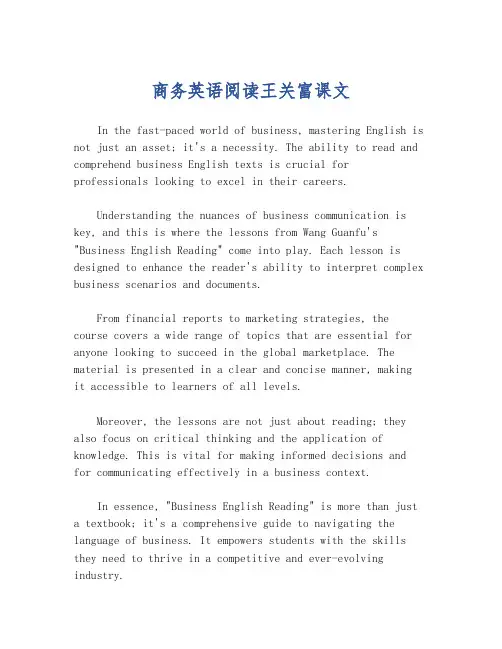
商务英语阅读王关富课文In the fast-paced world of business, mastering English is not just an asset; it's a necessity. The ability to read and comprehend business English texts is crucial for professionals looking to excel in their careers.Understanding the nuances of business communication is key, and this is where the lessons from Wang Guanfu's "Business English Reading" come into play. Each lesson is designed to enhance the reader's ability to interpret complex business scenarios and documents.From financial reports to marketing strategies, the course covers a wide range of topics that are essential for anyone looking to succeed in the global marketplace. The material is presented in a clear and concise manner, makingit accessible to learners of all levels.Moreover, the lessons are not just about reading; they also focus on critical thinking and the application of knowledge. This is vital for making informed decisions andfor communicating effectively in a business context.In essence, "Business English Reading" is more than just a textbook; it's a comprehensive guide to navigating the language of business. It empowers students with the skills they need to thrive in a competitive and ever-evolving industry.。
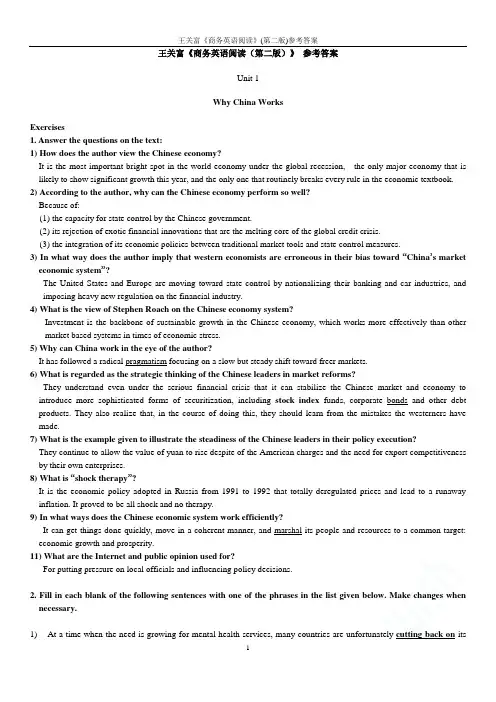
王关富《商务英语阅读(第二版)》参考答案Unit 1Why China WorksExercises1. Answer the questions on the text:1) How does the author view the Chinese economy?It is the most important bright spot in the world economy under the global recession, the only major economy that is likely to show significant growth this year, and the only one that routinely breaks every rule in the economic textbook. 2) According to the author, why can the Chinese economy perform so well?Because of:(1) the capacity for state control by the Chinese government.(2) its rejection of exotic financial innovations that are the melting core of the global credit crisis.(3) the integration of its economic policies between traditional market tools and state control measures.3) In what way does the author imply that western economists are erroneous in their bias toward “China’s market economic system”?The United States and Europe are moving toward state control by nationalizing their banking and car industries, and imposing heavy new regulation on the financial industry.4) What is the view of Stephen Roach on the Chinese economy system?Investment is the backbone of sustainable growth in the Chinese economy, which works more effectively than other market based systems in times of economic stress.5) Why can China work in the eye of the author?It has followed a radical pragmatism focusing on a slow but steady shift toward freer markets.6) What is regarded as the strategic thinking of the Chinese leaders in market reforms?They understand even under the serious financial crisis that it can stabilize the Chinese market and economy to introduce more sophisticated forms of securitization, including stock index funds, corporate bonds and other debt products. They also realize that, in the course of doing this, they should learn from the mistakes the westerners have made.7) What is the example given to illustrate the steadiness of the Chinese leaders in their policy execution?They continue to allow the value of yuan to rise despite of the American charges and the need for export competitiveness by their own enterprises.8) What is “shock therapy”?It is the economic policy adopted in Russia from 1991 to 1992 that totally deregulated prices and lead to a runaway inflation. It proved to be all shock and no therapy.9) In what ways does the Chinese economic system work efficiently?It can get things done quickly, move in a coherent manner, and marshal its people and resources to a common target: economic growth and prosperity.11) What are the Internet and public opinion used for?For putting pressure on local officials and influencing policy decisions.2. Fill in each blank of the following sentences with one of the phrases in the list given below. Make changes when necessary.1)At a time when the need is growing for mental health services, many countries are unfortunately cutting back on itsspending.2)There is an increasing number of people out of work. But the western media often unfairly label them as lazy andreliable.3)Now that the flow of oil has been stopped by BP, the impact of all the spilled oil and natural gas is still beingmeasured.4)Once again its ability to steer economic policy will be tested against the ability to deliver on services and projectsaimed at growing the economy and jobs.5)Housing prices are incredibly high today. But he bought his house for a song about five years ago.6)As people are complaining high prices, especially those related to daily necessities, the government feels rather urgentto hold down inflation rate immediately.7)Under the new economy policy investors are invited to buy into state-owned enterprises.8)Since a serious gun shooting occurred in Arizona last week, security concerns have trickled down to all places,including residential buildings.9)Social unrest is a daily occurrence in the country nowadays. It is in the last place when it comes to investment formultinational companies.10)Efforts to ban smoking in China are so effective yet. Some chain smokers never think of quitting while many othershave battled in vain to quit.3. Match the terms in column A with the definitions in column B:A_______________________ B__________________________________1)financial innovation A) A reduction in the general availability of loans (orcredit) or a sudden tightening of the conditionsrequired to obtain a loan from the banks.72)stimulus package B) A non-bank entity or organization such asinvestment companies and mutual funds thatinvests in large quantities. 83)overheating C)A legal entity created by a government to undertakecommercial activities on its behalf. 64)stamp tax D) The trading of a corporation's stock or othersecurities (e.g. bonds or stock options) byindividuals with potential access to non-publicinformation.9E) An industry that requires large amounts of capital, machinery and equipment toproduce goods. 55)capital-intensive sector F) Generation of new and creative approaches tosecurities, money management or investing. 16)state-run firm G) An economy that is expanding so rapidly that toomuch money is chasing too few goods andeconomists fear a rise in inflation . 37)credit crisis H) tax levied on certain legal transactions such as thetransfer of a property such as building, copyright,land, patent, and securities. 48)institutional investor I) A plan or a series of measures taken by agovernment to jump-start its ailing economy,generally as a part of its fiscal policy. 210) insider trading4. Translate the following passage into Chinese.我们所面临的来自中国的真正挑战并不是他们向我们大量销售的货物,而恰恰相反,是他们正在提升的价值链。
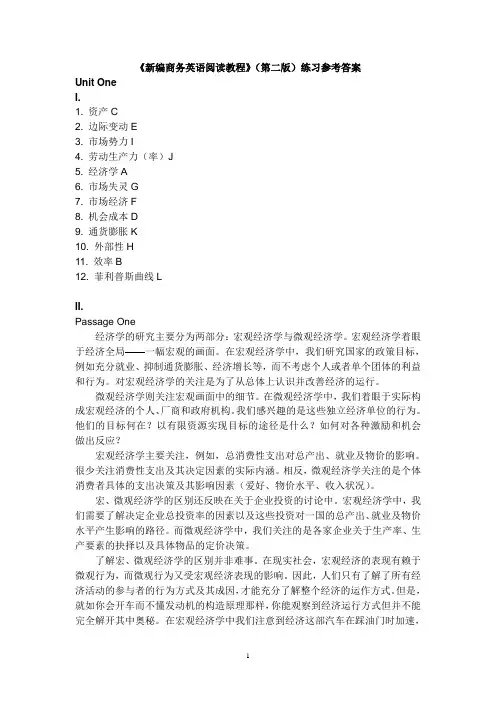
《新编商务英语阅读教程》(第二版)练习参考答案Unit OneI.1. 资产C2. 边际变动E3. 市场势力I4. 劳动生产力(率)J5. 经济学A6. 市场失灵G7. 市场经济F8. 机会成本D9. 通货膨胀K10. 外部性H11. 效率B12. 菲利普斯曲线LII.Passage One经济学的研究主要分为两部分:宏观经济学与微观经济学。
宏观经济学着眼于经济全局——一幅宏观的画面。
在宏观经济学中,我们研究国家的政策目标,例如充分就业、抑制通货膨胀、经济增长等,而不考虑个人或者单个团体的利益和行为。
对宏观经济学的关注是为了从总体上认识并改善经济的运行。
微观经济学则关注宏观画面中的细节。
在微观经济学中,我们着眼于实际构成宏观经济的个人、厂商和政府机构。
我们感兴趣的是这些独立经济单位的行为。
他们的目标何在?以有限资源实现目标的途径是什么?如何对各种激励和机会做出反应?宏观经济学主要关注,例如,总消费性支出对总产出、就业及物价的影响。
很少关注消费性支出及其决定因素的实际内涵。
相反,微观经济学关注的是个体消费者具体的支出决策及其影响因素(爱好、物价水平、收入状况)。
宏、微观经济学的区别还反映在关于企业投资的讨论中。
宏观经济学中,我们需要了解决定企业总投资率的因素以及这些投资对一国的总产出、就业及物价水平产生影响的路径。
而微观经济学中,我们关注的是各家企业关于生产率、生产要素的抉择以及具体物品的定价决策。
了解宏、微观经济学的区别并非难事。
在现实社会,宏观经济的表现有赖于微观行为,而微观行为又受宏观经济表现的影响。
因此,人们只有了解了所有经济活动的参与者的行为方式及其成因,才能充分了解整个经济的运作方式。
但是,就如你会开车而不懂发动机的构造原理那样,你能观察到经济运行方式但并不能完全解开其中奥秘。
在宏观经济学中我们注意到经济这部汽车在踩油门时加速,踩刹车时减速。
这就是我们在大多数情形下所需了解的一切。
然而,汽车总有出故障的时候。
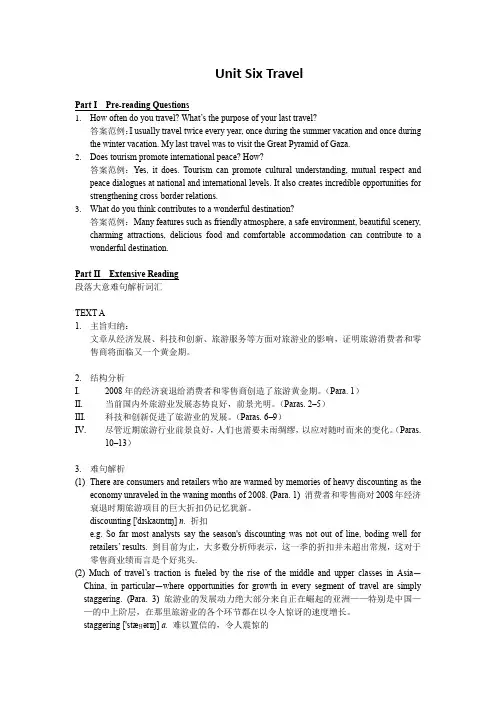
Unit Six TravelPart I Pre-reading Questions1.How often do you travel? What’s the purpose of your last travel?答案范例:I usually travel twice every year, once during the summer vacation and once during the winter vacation. My last travel was to visit the Great Pyramid of Gaza.2.Does tourism promote international peace? How?答案范例:Yes, it does. Tourism can promote cultural understanding, mutual respect and peace dialogues at national and international levels.It also creates incredible opportunities for strengthening cross-border relations.3.What do you think contributes to a wonderful destination?答案范例:Many features such as friendly atmosphere, a safe environment, beautiful scenery, charming attractions, delicious food and comfortable accommodation can contribute to a wonderful destination.Part II Extensive Reading段落大意难句解析词汇TEXT A1.主旨归纳:文章从经济发展、科技和创新、旅游服务等方面对旅游业的影响,证明旅游消费者和零售商将面临又一个黄金期。
第1课中国是今年唯一呈现出重大发展的主要经济体(economy),由于它通常是唯一敢于打破经济教科书中每一条例的经济体。
事实上,中国不像其他五大经济体那样发展缓慢的主要原因是,它宏观调控的能力(its capacity for macro-economic control)为什么中国市场经济体系奏效?(market economic system)目前,欧美等国正通过银行及汽车业国有化及金融业实施新的有力规定(regulations),走向宏观调控。
但问题更加紧迫(the question has a new urgency)。
中国看上去最能驾驭(navigate)七十年内最糟的经济滑坡(downturn)在危机中,中国官员既能吸取像西方同行(counterparts)的传统市场工具,也能吸取中国市场经济体系的积累经验(arsenal)。
去年早期,由于房地产市场(housing market)过热,中国官员仅命令银行削减房贷(cut back on housing loans),然后随着房屋销售量下降(fall),他们提供类似更低的房屋购置税(lower taxes on home purchases)。
最近几周,他们展开类似西方的经济救援行动(launch economic rescue efforts),其中包括价值6000亿的大计划以增加政府开支和大幅利率削减(ramp up government spending)(big interests cuts)。
但同时,他们也发布在西方国家眼里是不合理的干涉的命令,例如,上周中国官员召集包括钢铁建筑等行业的国有行业并购(buy up)国内外新资产(at home and abroad)以积极(actively)发挥在经济中的作用曾把中国宏观调控视为不成熟经济的弊病(immature economy),现在是稳定的保障(bulwark of stability)。
商务英语阅读(第二版)-王关富Unit2The-World-Economic-For um-课后答案Unit 2A Changed Global RealityExercises1. Answer the questions on the text:1) What are the features of the two major economies that the world has seen formore than 200 years?One has dominated technological innovation and trade and amassed great wealth. The second—much of it politically under the thumb of the first—has remained poor and technologically dependent.2) How much did low-and-middle-income countries contribute to world growthin 2010?Almost half (46%)3) Taking a long term view, why is it good news that developing countries aregrowing fast?As billions of poor people become more prosperous, they will be able to afford comforts their counterparts in the rich world have long considered the normal appurtenances of life.4) What are the worst-case scenarios that Europe has so far avoided?A collapse of the euro, a debt crisis that spills from small economies such asGreece and Ireland to much bigger ones like Italy and Spain, and bitter social unrest in those nations that are having to massage wages down while cutting public budgets.5) Why does Jim Walker think that 2011 will be a “year of reckoning”?Because Jim Walker thinks that the rebound in the US is a mirage created by excessive stimulus. He expects the US to slip into the double dip it dodged in 2010.6) Why has the private-sector debt crisis of 2008-2009 morphed into apublic-sector debt crisis in 2010-11?It has been the result of the debt and deficits amassed in the process of stimulating economies and bailing out banks during the downturn.7) What are the risks that emerging economies face?a. sharp rise in inflationb. rising oil pricesc. soaring food price8) What did China and India do to cope with inflation and rising food prices?China raised the reserve-requirement ratio;India resorted to diplomatic means when Pakistan temporarily cut off some exports of onions to the country.9) How can the disaffection with global capitalism in the developed world beprevented from turning into a backlash against it?It would help if there were mechanisms in place to manage the stresses in the international economy.10) What is the most serious division between countries that policymakers haveto contend with?Economic disparity2.Fill in each blank of the following sentences with one of the phrases in the listgiven below:1) The search for the child was scaled back sharply today, with almost a third ofthe volunteers heading home.2) The former Federal Reserve Chairman says there is a risk that the US couldslip into a recession by year’s end.3) The CEO of the firm said that they would switch priority from traditionallabor-intensive products to more hi-tech and value-added ones.4) In the aftermath of the financial crisis the group has put on hold some of itsambitious regional expansion plans.5) Toyota Motor Corp. is offering widespread job buyouts to its US workers for the first time and cutting the workweek at some of its American plants by 10% to contend with falling sales.6) Eventually, it must morph into a system that functions on stability, or it willfail and cause an unstoppable breakdown and widespread hardship.7) Unfortunately most of the central banks in the world today are still firmlyunder the thumb of politicians.8) The stock market’s endurance could depend heavily on whether economic andcorporate performance remains uncertain, or begins indicating that the economy truly is out of the woods.9) Survivors were encouraged to talk about their horrible experiences to helpthem come to terms with the flood disaster.10) Other countries—notably Australia—have also avoided a bust in theirhousing markets, and have instead seen prices increases flatten out.3.Match the terms in column A with the explanations in column B:AB ______1)double-dip recession A) A physical substance, such as food, grains, andmetals, which is interchangeable with anotherproduct of the same type, and which investors buyor sell, usually through future contracts 72) credit rating B) A measure that examines the weighted average ofprices of foodstuffs, often used as an importantfactor to assess the cost of living. 93) austerity C) A government policy of deficit-cutting, lowerspending, and a reduction in the amount of benefitsand public services provided, sometimes coupledwith increases in taxes to pay back creditors toreduce debt. 34) private sector D) A central bank regulation that sets the minimumreserves each commercial bank must hold tocustomer deposits and notes. 105)protective tariff E) The part of the economy that is not statecontrolled, and is run by individuals and companiesfor profit. 46)beggar thy neighbor F) An expression in economics describing policy thatseeks benefits for one country at the expense ofothers. Such policies attempt to remedy theeconomic problems in one country by means whichtend to worsen the problems of other countries. 6 7) commodity G)A published ranking based on detailed financialanalysis by a credit bureau, of one’s financialhistory, specifically as it relates to one’s ability tomeet debt obligations. 28)sovereign-debt crisis H) A crisis in which a national government owes somuch debt that it is unable to repay or on the edgeof bankruptcy. 89)food-price index I) A tariff which tries to ban imports to stop themcompeting with local products 510)reserve requirement J) A situation where economic growth slides back tonegative after a short-lived growth and theeconomy may move into a deeper and longerdownturn. 14.Translate the following into Chinese:星期五,世界上20个主要经济体的领导人结束了在这座东北亚首都城市举行的为期两天的峰会。
Chapter 1 Why China Works中国是今年唯一呈现出重大发展的主要经济体(economy),由于它通常是唯一敢于打破经济教科书中每一条例的经济体。
事实上,中国不像其他五大经济体那样发展缓慢的主要原因是,它宏观调控的能力(its capacity for macro-economic control)。
为什么中国市场经济体系奏效?(market economic system)目前,欧美等国正通过银行及汽车业国有化及金融业实施新的有力规定(regulations),走向宏观调控。
但问题更加紧迫(the question has a new urgency)。
中国看上去最能驾驭(navigate)七十年内最糟的经济滑坡(downturn)。
在危机中,中国官员既能吸取像西方同行(counterparts)的传统市场工具,也能吸取中国市场经济体系的积累经验(arsenal)。
去年早期,由于房地产市场(housing market)过热,中国官员仅命令银行削减房贷(cut back on housing loans),然后随着房屋销售量下降(fall),他们提供类似更低的房屋购置税(lower taxes on home purchases)。
最近几周,他们展开类似西方的经济救援行动(launch economic rescue efforts),其中包括价值6000亿的大计划以增加政府开支和大幅利率削减(ramp up government spending)(big interests cuts)。
但同时,他们也发布在西方国家眼里是不合理的干涉的命令,例如,上周中国官员召集包括钢铁建筑等行业的国有行业并购(buy up)国内外新资产(at home and abroad)以积极(actively)发挥在经济中的作用。
曾把中国宏观调控视为不成熟经济的弊病(immature economy),现在是稳定的保障(bulwark of stability)。
Unit 8The decade of SteveExercises1.Answer the questions on the text.1)What makes the story of Steve Jobs so incredible and remarkable?So perseverant in his goals;Experiencing and overcoming so many difficulties and frustrations;Dominating in as many as four distinct industries;Running Apple so well------creatively, competitively, and profitably;Miraculously returning from his fatal diseases.2)What are the four markets that Steve Jobs reorganized and dominated?Music, movies, mobile telephones as well as computing.3)Why is he regarded as the rare businessman?Predilections unique to him.Distinctive design taste and elegant retail stores.Outside-the box approach to advertisingA showman, born salesman, and a magician.Legitimate worldwide celebrityAlways making products customers want to buy.Visionary but grounded in reality.Motivated not by money, but by a visceral ardor for Apple.4)What astounding achievements has Steve Jobs made up to date?Increasing corporate worth from $5 billion in 2000 to $170 billion now.Moving from cash drain and near bankruptcy to $34 billion in cash and market securities.275 retail stores in 9 countries with 73% share of US MP3 player market, and undisputed leadership in mobile phone innovation.His personal net worth about $5 billion.5)What was the first important success of Steve’s team?It created the first Macintosh (iMac), a breakthrough all-in-one computer and monitor. With drastic cost cutting and lucrative sales, it greatly improved the Apple’s balance sheet and financially got Apple well prepared for big investments and business leap.6)Why did Steve object to Ellison buy out Apple in 1997?Because he didn’t like people to second-guess the intention of his return (as making money) and wanted to take high moral ground so that he could easy and graceful decisions.7)Why did Steve build Apple-owned retail stores and some have doubts?Because through the building of retail stores, Steve could establish direct contact with customers, get to know what they really want, and fill the stores with allthose products.But some people at the time, even members of the board had great doubts about establishing retail stores. They are extremely nervous that the stores might become a risky cash drain.8)What are the outstanding qualities reflected from Jobs’integration ofmicromanagement with big-picture vision?# Micro-management:Consciousness/ dedication/ concentrationHe tries to know everything about Apple. He is involved in so many details that people can hardly believe. He is so detailed that he might tell an ad writer that the third word in the fourth paragraph wasn’t right.# Big-picture vision:Acumen for market changeHe recognized gorgeous design as differentiator for Apple.Creative, innovative and visionary in product developmentClients responded “Give me the next Steve Jobs”Knack for taking opportunities at the right momentHe made iTunes compatible with Windows and expanded Apple market to all PCs.He developed Apple’s own digital-music sales stores.9)How did Steve Jobs master the message?Carefully consider what he and Apple say and don’t say to the public.Rehearse time and again before speaking publicly.Authorize only a small number of executives to speak publicly.He is careful to avoid overexposure.Nobody is supposed to speak without the permission of Apple’s media relations team reporting directly Steve Jobs.10) How did Steve Jobs handle Apple’s stock options backdating scandal?He remained silent initially but later in the report to SEC he admitted and apologized for the change of option grant dates for employee benefits. He said it was totally inappropriate for Apple to do.11) Whom did Steve Jobs thank and why when he returned?He thanked Tim Cook (Apple’s chief operating officer) for excellent running of the company during his absence.He also thanked a twentysomething who died in a car crash for donating his liver.12) How do people feel about the future of Apple?Though some are worried about its future due to Steve’s health problem, most are confident about its future because:He is a fabulous brand and irreplaceable person.He has educated and influenced Apple employees well enough to think and behave like him.His influence has gone beyond Apple and become a hero for the IT industry.His pursuit for secrecy and surprise and proven brilliance will ensure greater successes for Apple in the future.2.Fill in each blank of the following sentences with one of the phrases in the listgiven below. Make changes when necessary.1)When the starlet was asked about her new boyfriend, she couldn’t help but gushabout him and their intimate plans for Valentine’s Day.2)The leaking of as many as 251,000 State Department documents, including secretembassy reports from around the world, is nothing short of a political meltdown for US foreign policy.3)With very critical views on the government economic policies, she often palsaround with those scholars who also take rather radical stance on economic issues.4)It is high time for everyone in the department to kick into full gear and fulfill oursales quota by the end of the year.5)The mother did whatever possible to prevent her son from hanging out with theguy who she thought was up to nothing good.6)Obama’s victory in the election was viewed by many as progress in the UnitedStates. But I think his ethnicity is beside the point.7)The neighbors said what happened was totally out of character for the womanthey knew as quiet and friendly.8)Unfortunately, the firm has not been able to pare) production cost to the level thatmatches its competitors in the market.9)On the back of strong corporate earnings reports from a number of firms last week,coupled with the improving unemployment rate, investor sentiment was bolstered on the first trading day of the week.10)The team is expected to take a vote tonight that could set in motion a new plan torevitalize the financial market.11)It was a long time before our business partners could catch on to what we reallyintended.12)As a shrewd man, he successfully pounced at the opportunity last year to becomethe marketing manager.3.Match the terms in column A with the definitions in column B:A______________________ B________________________________________ 1)market share A) A group of advisors, originally to a political candidate,for their expertise in particular fields, but now to anydecision makers, whether or not in politics. 62)cash drain B) The rate of new product development, which isgetting faster with more severe competition andfaster technological advancement. 103)shareholder wealth C) Percentage or proportion of the total availablemarket or market segment that a product orcompany takes. 14)net worth D) A group of executives employed to manage aproject, department, or company with theirparticular expertise or skills. 55)management team E) A person, project, business or company thatcontinues to consume large amounts of cash withno end in sight. 26)brain trust F) A person or firm that invests in a businessventure, providing capital for start-up orexpansion, and expecting a higher rate of returnthan that for traditional investments. 97)balance sheet G) The wealth shareholders get to accrue from theirownership of shares in a firm, which can beincreased by raising either share prices ordividend payments. 38)captains of industry H) A financial statement that summarizes acompany's assets, liabilities and shareholders'equity at a specific point in time. 79)Venture capitalist I) Total assets minus total liabilities, an importantdeterminant of the value of a company, primarilycomposed of all the money that has been investedand the retained earnings for the duration of itsoperation. 410)product cycle L) A business leader who is especially successfuland powerful and whose means of amassing apersonal fortune contributes substantially to thecountry in some way. 84.Translate the following passage into Chinese:头已秃顶,留着胡须的他坐在其超大的华盛顿办公室内谈论着经济话题,从眼神可看出显得疲劳。
Unit 4The Incredible Shrinking EuropeExercises1. Answers to the questions on the text:1) What was the dream that the Europhiles were familiar with?Their dream was to make E.U. a newly emboldened world power stepping up to calm trouble spots, using aid and persuasion where it could, but prepared to send in troops when it had to.2) Why does the passage say that Europe is a remarkably good place to live? Because Europe is more stable, safe, green and culturally diverse than most parts of the world and a quality life can be guaranteed in E.U. states.3) Does the good life at home make Europe strong abroad ? Why?No, a good life at home doesn’t mean a strong Europe abroad. Because the E.U. may have all the soft-power credentials in the world, but on the grand stage it has lacked the weight and influence of others on some big issues.4) What do Critics think of the selection of Herman Van Rompuy and Catherine Ashton as Europe's President and Foreign Minister?They consider the selection as symbolic of a lack of vision and it means the grouping will have to reconcile itself to five years of underperformance.5) What can be listed as E.U.’s achievements in the years around 1980s according to the passage?By extending an area of peace and liberal government to the east, the E.U. has done much to calm a part of the world that not long ago was the cockpit for murderous rivalries.6) In what way can Europe realize its own dreams and those of others according to the passage?It has to act as a true single bloc and win others to its side.7) Why does the German government face enormous domestic challenges in admitting its forces in Afghanistan are there to fight, not to be humanitarian workers in uniform ?Because one of modern Europe's most cherished convictions is that the force of arms rarely settles political disputes for long and European public opinion in the 20th century seems unwilling to commit to the war in Afghanistan for the long haul.8) What roles did Germany play in Europe in the 20th century?For the last half of the 20th century, Germany was at the heart of the European experiment. But since the end of the Cold War, it has stepped back from the E.U. and begun strengthening ties with Russia.9 What are the advantages for E.U. to be chosen as the White House’s partner?The advantages are that Europe is rich and democratic, and its values are closer to those of the U.S. than those of anywhere else.2. Fill in each blank of the following sentences with one of the phrases in the list given below. Make changes when necessary.1) China will adhere to the principle of developing high technology and realizingindustrialization to step up the commercialization, industrialization and internationalization of scientific and technological achievements.2) In the recent crisis no banks could manage to bail out the companies in financial pressure.3) In terms of the information from the Universe he is apathetic and sometimes irritable, he is like an ostrich sticking his head in sand.4) It will be up to the board to decide if the CEO should be removed.5) All our hopes rest upon the arrival of the shipment.6) The plan has already been worked out, and could be put into operation at a moment's notice.7) The whole machinery of civilization will break down if this doctrine wins in the war.8) His remarks hit home when he said that we did not work enough.9) Some analysts suspected that Toyota had pulled strings to stifle probes into its auto quality problems.10) Mercy is reaching out to those who have nothing to give back to you.3. Match the terms in column A with the explanations in column B:A ____________________ B_____________________________________1)free market A) Effects on the behavior of individuals causedby observation of the actions of others and theirconsequences. 32) coalition government B) An economic turmoil where companies gobankrupt, people are laid off, and markets aresluggish. There is a lot of panic in bothbusiness and daily lives.93) demonstration effects C) A market in which there is no economicinterventionby the state, except to enforceprivate contracts and the ownership of property.14) health insurance D) A qualified retirement plan set up by acorporation, labor union, government, or otherorganization for its employees. 6E) A form of collectivism by means of whichpeople collectively pool their risk, in this casethe risk of incurring medical expenses. 45) national interest F) The ability to obtain what one wants througheconomic or cultural means. It allows nations toexert their influence without using militarymeans or coercion. 86) pension scheme G) A fight or contention for territory, power,control, or resources between tow more partiesin a place or area.. 77) turf war H) Things of great importance to a nation,including its goals, visions and ambitions inpolitical, economic, cultural fields, etc. andactions, circumstances, and decisions to achievethem. 58) soft power I) A cabinet of a parliamentary government inwhich several parties cooperate. 29) economic crunch4. Translate the following into Chinese.有什么能让欧洲振奋起来吗?当然:如果欧洲领导人能像20年前那样抓住时机,欧盟就将繁荣昌盛。
Unit 6Goodbye, Free Trade?Exercises1.Answer the questions on the text.1) What was the result when the House of Representatives passed theHawley-Smoot Tariff Act in 1930?The economic recession in the United States became even worse.2) According to the author, what happens when a currency appreciates?It diminishes the export advantage of the country and makes it difficult to increase exports or even maintain the status quo.3) How did American politicians take advantage of the public’s stronganti-free-trade sentiment in the United States?They created a talking point in charges of unfair trade so that they thought they could benefit in the mid-term elections.4) What did American politicians and economists agree and disagree over theHawley-Smoot Tariff Act?Almost all of them agreed that it was a bad law, but they disagreed whether it triggered the Great Depression in the 1930s.5) What did Milton Friedman think were the more important reasons for theGreat Depression?The malfunctioning gold standard system and inept monetary policy of the Federal Reserve.6) What was the foreign reaction unexpected by the American lawmakers afterthe Hawley-Smoot Tariff Act was enacted?The trading partners were angered and imposed discriminatory tariffs on American goods. Canada in particular, as the largest export market for the US, reacted fiercely and handed its market over to the British competitors.7) Why is it unlikely for the US to adopt another Smoot-Hawley today in the eyeof the author?(1)The US is much more integrated into the world economy today than it was inthe 1930s.(2)Import restrictions seldom achieve their intended goals, instead, often end uphurting American industries and consumers.(3)The Americans have learned to consider the possible strong foreignretaliation against US exporters.8) What were the respective results for those countries withdrawing from thegold standard and those clinging to it during the 1930s according to the author?Those countries going off the gold standard allowed their currencies to depreciate, avoided protectionist trade policies and, instead, used monetary policy to end price deflation and stimulate economic growth.Those countries choosing to stay on pursued protectionist trade policies by imposing high tariffs, import quotas and exchange controls, which did little in boosting their economic growth. Thus they suffered a longer economic depression.9) How does the author justify his support for the policy of "quantitativeeasing"?(1) Historically, the most important tool for resisting protectionist sentiment in the1930s was a monetary policy that would promote economic growth.Today the US is in a similar situation. Taking right monetary policy can alleviate the pressure on Washington to adopt protectionist trade policy and can help to raise output before it leads to a high inflation.(2) He also quotes what Charles Evens said: Additional measures taken by the Fedto stimulate growth should condoned, not condemned.(3) What Mr. Friedman wrote 1997 about Japan: The surest road to a healthyeconomic recovery is to increase the rate of monetary growth, to shift from tight money to easier money.10) What does the author imply about the US Congress?In comparison with the Fed, the US Congress is following a trade protectionist policy in blaming other countries for its unemployment and may cause serious trade retaliations from trading partners.2. Fill in each blank of the following sentences with one of the phrases in the list given below. Make changes when necessary.1)As the financial scandal involves so many people, the probe in to it could dragon for another year.2)In the age of globalization more individuals are forced to integrate intomultinational work teams.3)Many in Europe are now very much worried that it may sink into a Japan-styleeconomic recession.4)But the business leaders yesterday warned against interest rate rises, arguing thatinflation was being driven not by consumer spending, but by rising commodity prices.5)After the call scandal, the American automakers and some politicians there wereso eager to keep their rival Toyota at bay in the auto market.6)Under the current labor law, two categories of employees are exempt fromminimum wage and overtime requirements.7)Though the local partner made a revised offer, the foreigner investor refused andreverted back to the original agreement conditions.8)Last Friday the two parties met for more than five hours only to end up walkingaway from the table once again, reaching no agreement at all.9)When the government supervises banks, it should take into account their payand bonus structures which may often be the source of corruption.10)The customers severely affected in the incident demanded that the company putin place effective measures to avoid occurrence of such things in the future. 11)It’s critical to take hold of any opportunity coming your way because it willnever come back again once lost.12)At times of economic depression, people are more inclined to unethical means intheir business.3. Match the terms in column A with the definitions in column B:A__________________________ B____________________________________ 1)unfair trade A) Restrictions that governments put in placeon the purchase or sale of a foreign or localcurrency, particularly by those in shortageof hard currencies. 62) real estate B) Escalation of protectionism between two ormore countries that impose punitive tariffsand barriers in retaliation for each other. 83) business cycle C) A general decline in prices often caused bya reduction in the money supply or a decreasein spending. 54) trade protectionism D) Unjustifiable and discriminatory policiesand supports by a government to its ownfirms, ranging from export subsidies to anti-competitive practices. 15) price deflation E) Land, buildings, homes or anything fixed,immovable, or permanently attached that canbe traded in the market. 26) exchange control F) The policy of imposing duties or quotas onimports in order to protect home jobs,markets or industries from overseascompetition. 97) competitive currency devaluation G) A company or country with whom you havean ongoing business relationship and engagein importing or exporting activities. 108) trade war H) A predictable long-term pattern ofeconomic activity that an economyexperiences four stages including decline,recession, recovery and boom. 39) import barriers I) The currency devaluation by a governmentto make its goods more competitive in theinternational markets. 710) trading partner L) The economic policy of restrainingbusiness between states through a variety ofgovernment actions to discourage importsand prevent foreign take-over of domesticmarkets and companies. 44. Translate the following passage into Chinese.按官方的说法,中美间过去三天日益严重的贸易纠纷涉及轮胎、鸡肉和汽车,但实际上远远超出此范围。